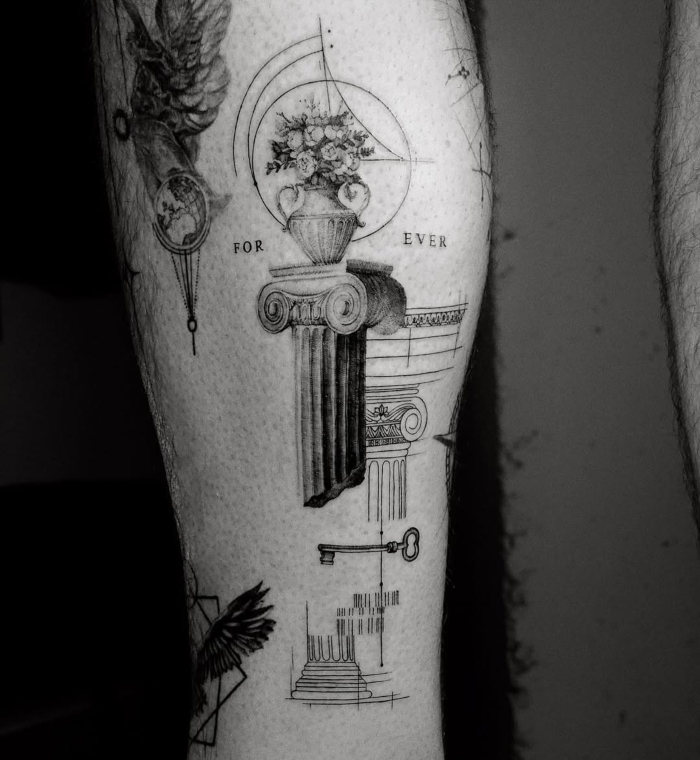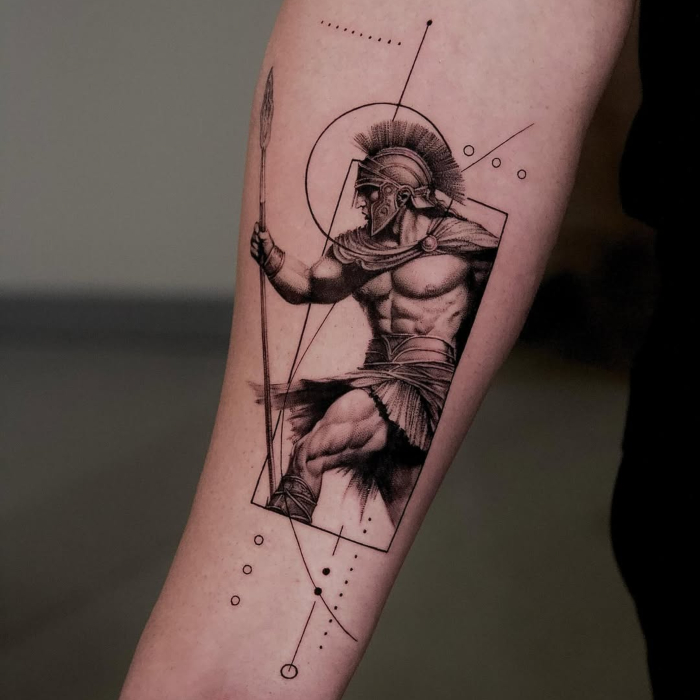We are glad to present today Alya, a Ukrainian-born tattoo artist now based in Canada, whose fine line microrealism and classical influences are gaining recognition in the Canadian tattoo scene.
With a background in academic drawing and graphic design, she brings technical precision and artistic depth to every piece she creates. Beyond her craft, Alya is also the founder of Serpent Skin Tattoo Collective, a new studio in New Westminster that reflects her commitment to both artistic freedom and community-building.
For the readers who are not familiar with you, how would you introduce yourself?
My name is Alya. I’m a Ukrainian tattoo artist based in Canada. I specialize in microrealism and focus on designs that combine fine line work with the aesthetics of Renaissance art, Greek and Roman mythology. I’m also the owner of SerpentSkin Tattoo Collective, a new tattoo shop that just opened in New Westminster.
Where did your fascination for tattoos come from?
My fascination with tattooing started after working as a graphic designer for several years. I have 17 years of experience in academic drawing and traditional art, and I’ve always enjoyed artistic freedom. But when I started working in graphic design, I quickly realized how limited I felt creatively. I began looking for other ways to express myself through art, and tattooing was the next thing I tried. It gave me full freedom both creatively and technically.
I love the process, especially the feeling of pulling a clean line on skin. Black and grey art has always inspired me more than color, so tattooing in this style felt natural from the beginning. It also gives me the chance to meet people and work with them while staying creatively independent.
At what point in your life did you become a professional tattoo artist?
It’s hard to say exactly when that point was, because what does it even mean to be a professional tattoo artist? I’ve had months of bookings in advance for a while now, but I think it was after winning an award at the Vancouver Tattoo Show that I truly started to feel like one. That kind of recognition made it clear that I had reached a certain level in my career and that my work is being seen seriously.
How do you balance creativity with the client’s personal vision?
Honestly, I don’t have to work too hard to find that balance. My clients usually give me full creative freedom, and I focus on finding the best way to bring their ideas to life.
How would you describe the tattoo scene in Canada these days?
I wouldn’t say the tattoo scene in Canada is extremely competitive or intense. Compared to Europe, for example, I feel like the overall tattoo level there is higher because the competition is stronger. In Canada, it’s relatively easy to grow as an artist. People are more relaxed, and the lower population density creates a different pace. At the same time, one thing I really admire here is how open and supportive people are toward artists.
There’s a genuine appreciation for creativity, and people are always looking for custom, meaningful, and original work.
How would you define your current tattoo style and how did you end up focusing on it?
My style is called microrealism. My main inspiration comes from the aesthetics of the Renaissance, Baroque, and Art Nouveau periods. I’ve always been drawn to the artists from those eras, as well as to modern tattoo artists who work in a similar style. It feels refined, elegant, and fresh to me.
I’ve never connected with traditional or colorful tattoo styles, but fine line, graphic elements, and classical art are what truly resonate with me.
Walk us through your tattoo process.
I always start by listening to the client’s idea and asking questions to understand the intention behind the tattoo. Then I create a design that fits both the concept and the body placement. On the day of the session, I make sure the client is comfortable and we adjust anything if needed. From there, it’s all about focus and precision.
What’s the most challenging part of being a tattoo artist in 2025?
You can’t just be a tattoo artist anymore. You need to manage content creation, marketing, branding, customer service, and more. Balancing all of that with actual tattooing can be overwhelming.
Tell us about a tattoo project that challenged your skills the most.
Definitely the knight tattoo I did at the Vancouver Tattoo Show. It was technically complex and had a lot of detail. I spent a long time developing the design and it ended up winning Best Flash. That made all the effort worth it.
What’s your overall experience at tattoo conventions so far?
Recently, I participated in the Vancouver Tattoo Show as an official artist, representing my own shop. I ended up winning the Best Flash category. Before that, I attended a couple of conventions as a visitor, watching how artists presented themselves and how competitions worked. That experience helped me prepare and learn more about the convention world.
What’s your primary reason to attend a tattoo convention?
My main reason to attend a convention is to showcase my work and let people know that we’ve just opened a new shop. It’s also a great opportunity to connect with other artists and be part of the community. And of course, I love competing – it pushes me to be better than I was last time.
How do you think tattoo conventions could improve for the artists and the public?
The Vancouver Tattoo Show was very well organized. The only thing I would improve is the technical side of contest announcements. It was hard to hear through the mic, and they filmed entries with an iPhone, which didn’t show the work clearly. Better presentation would really help.
What would be your dream convention to attend?
I would really love to attend a convention in Italy or France. Italian artists are some of my biggest inspirations, it makes sense, since it’s the birthplace of the Renaissance.
What advice would you give to first-time artists attending or working at a convention?
Don’t be afraid to show your work. Prepare your setup in advance, bring your best designs, and talk to people. Stay calm and use it as a learning opportunity.
What advice would you offer to someone considering a career as a tattoo artist?
Study other artists, tattoo as much as possible, and learn art from all angles. And be ready to wear many hats, artist, marketer, content creator, and more.
Who are the people you admire the most within the tattoo community?
Oscar Akermo, who is also my mentor. I also admire Maria Alévares and all the artists at Monolith Studio in New York. Italian tattooers are a big inspiration too.
What’s your biggest accomplishment as a tattoo artist?
Opening my second tattoo shop in Canada, building a strong community, and winning an award at the Vancouver Tattoo Show. All that happened within three years of moving to Canada.
How do you stay at the top of your game?
I never sit still. I don’t take many days off and I’m constantly involved in new projects. I love growing, and standing still makes me uncomfortable.
What’s the most meaningful feedback you’ve ever received from a client?
There wasn’t one specific moment that changed everything, but the consistent “Wow, this is amazing!” reactions mean a lot to me.
What are your goals or dreams for the near future?
Winning more convention awards and growing my shop into a self-sustaining space, so I can focus more on personal artistic growth and support other artists too.
Do you have a sponsor? If so, what could you tell us about your sponsors?
After the Vancouver Tattoo Show, I was offered convention sponsorships by INKin and Revo Cartridges. The support is only for events right now, but I’m open to expanding those partnerships. I’d love to work with ink, needle, or machine brands like Ambition Soldier.
Is there anything else you would like to tell our readers?
That’s it for now. Thank you for reading!














Leave A Comment